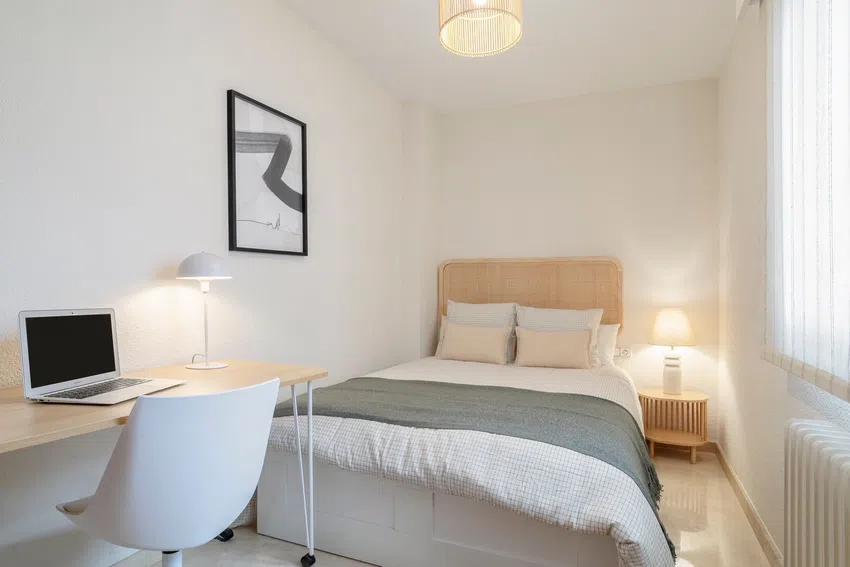Renting rooms is becoming an increasingly common practice in Spain, especially in cities where it is too expensive to rent the entire property, as is often the case in province capitals.
So, if you're looking to rent a room or if you're a landlord and you want to rent one out, you need to be aware of the legal and practical aspects involved. A room rental contract in Spain not only ensures that both parties are clear about their rights and responsibilities, but also avoids potential misunderstandings and conflicts. This article explains all the key information, from how it works, to its duration.
How does room rental work in Spain?
When you rent a room, you rent a bedroom in the flat, but you also have the right to use the common areas such as the living room, the terrace, the kitchen and the bathroom.
The room rental contract is done on a monthly, termly or academic year basis in the case of students. This type of renting is not subject to the rules of renting a property, which changes several issues:
- The tenant does not have the right to remain in the property beyond the term of the contract, so the landlord has more control over the property's availability.
- By renting out several rooms, the landlord benefits from the reduced risk of non-payment and can replace a tenant who does not pay the rent more quickly. However, the higher turnover of tenants may mean more work for the landlord, who does not have tax benefits in terms of income taxation.
- The room rental contract must specify the purpose of the room rental and the duration of the rental period. As in the case of seasonal rentals, the property is usually provided with the basic furnishings and the landlord is responsible for the utilities, even though this expense may later be included in the rent.
Room rental regulations in Spain
There are various opinions regarding what regulations apply to room rentals in Spain. Generally, this type of rental is regulated by the Civil Code, in Article 1554 and later articles. However, it could be subject to the Law on Urban Leases (LAU), although this type of rental is not specified.
Room rental contracts in Spain
When drawing up a room rental contract, no minimum content is legally required, and it does not even have to be in writing. However, to avoid future problems between the landlord and the tenant, a written contract is advisable. Likewise, it should contain, as a minimum, these elements:
- The room the tenant will occupy, referring to it exactly, so that there is no confusion.
- The contract duration.
- The rental price and the payment method the tenant will use to pay the rent for the duration of the room rental.
- Any services included in the lease, such as the use of the kitchen or being able to connect to the internet, among others.
- Any additional costs, and how they are shared out, if relevant.
- Whether the tenant can sublet the room; if nothing is included in the contract, according to the provisions of the Civil Code, they may do so.

Sample room rental contract in Spain
On idealista, you can download free sample room rental contracts, with the non-payment clause included, in line with the latest law:
- Room rental contract in PDF (in Spanish)
- Room rental contract in Word (in Spanish)
How much do you have to pay to the tax authorities for renting a room?
There are different tax implications for room rental, both for the landlord and the tenant, so you should be aware of them before signing the rental agreement.
In the case of the landlord, they will have to declare the profit obtained from renting the room to the tax authorities. However, they can deduct between 50% and 100% of this amount depending on their situation:
- In cases where the tenant is between 18 and 30 years of age and has a net income above the IPREM (Multiplier for the Public Income Index), the landlord can deduct 100% of the rent.
- In all other cases, the landlord can only deduct 60% on income received in contracts entered into on or after 1 January 2011, and 50% in contracts entered into before 1 January 2011.
- If the owner uses the property as a primary residence and the mortgage is deducted, renting out a room will reduce part of this deduction. This will be proportional to the tenant's use of the property.
The tenant, on the other hand, should bear in mind that if they rent only one room of the property and not the entire property, the tax authorities do not consider it to be a permanent residence rental, so they cannot deduct tax for this concept.
Rights and obligations when renting a room in Spain
There is no legal regulation on room rental contracts, so the rights and obligations of the landlord will be determined by the contract itself. However, both parties must enter into the contract for it to be valid, and the following must be taken into account:
- If the property is rented by several people, the contract must be formalised between all the tenants in a single lease. All tenants will appear on the same contract.
- If a room is rented with the right to use the common areas of the house, a separate rental contract must be drawn up for the rest of the occupants of the house. The rights and obligations acquired by the tenant with the landlord must be included in the contract.
How do you know if a room rental contract is legal?
For a rental contract to be legal, it must contain the following information:
- The parties: Full names, ID number (Spanish DNI, passport or foreigners number [NIE]), address and telephone number of the landlord and the tenant. It must be proven who owns the rented home.
- Property description: Specify the property's exact address, describe the rented room (including m2, furniture, etc.) and the common areas the tenant can access.
- Contract duration: The start and end date of the contract.
- Rent: The monthly rent, the payment method (transfer, cash, etc.) and the payment terms.
- Deposit: The deposit amount, payment and return conditions. A deposit is not mandatory but can be requested.
- Expenses: Who is responsible for community expenses, water, electricity, gas, etc.
- Works and repairs: Who is responsible for the necessary works and repairs.
- Contract termination: The causes that may give rise to the contract being terminated, such as not paying the rent or not following household rules.
